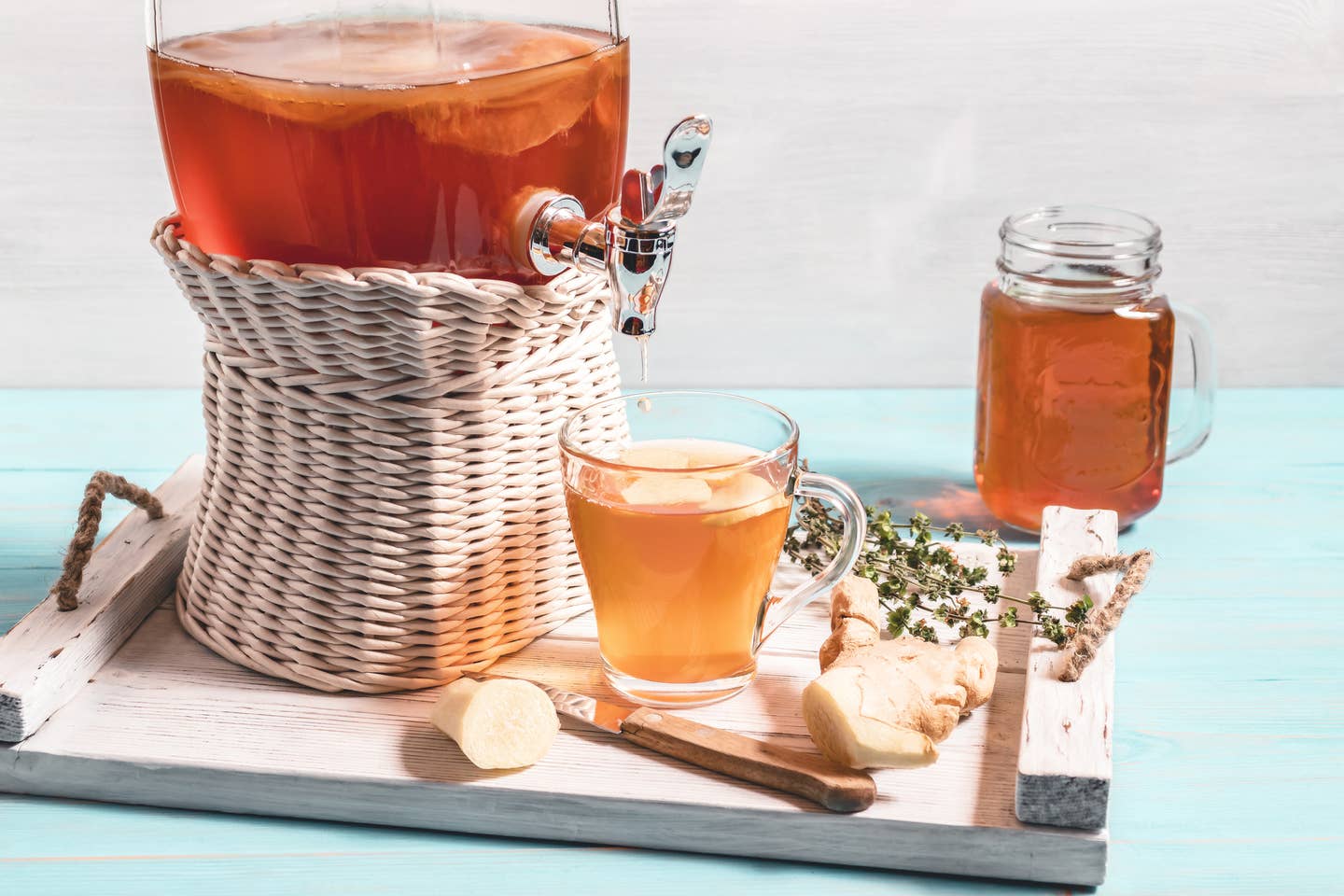
What Is Kombucha? Everything You Need to Know About the Probiotic Drink
Kombucha, the fermented probiotic tea beverage, a once niche specialty health drink, has now officially gone mainstream. Kombucha Brewers International (KBI), a trade organization for kombucha brewers and consumers, says the kombucha drink category has been on an upward trajectory since 2014.
“Kombucha has grown 30 percent in the natural channel and 50-75 percent in the conventional channel year over year,” says Hannah Crum, founder and president of KBI. “Kombucha is the fastest growing functional beverage category and now [has] more than 1700 commercial brewers worldwide.”
Many people thought the kombucha craze was a simple health trend, but this power drink has proven its staying power. If you are not on the kombucha train, maybe you should hop on. Read on to find out why.
There are still many questions you may have about this drink that promises better gut health, digestion, weight loss, and other benefits. So, in honor of World Kombucha Day—yes, that is a thing, and the inaugural Day is February 21, 2020—we are sipping a glass of ‘booch', and answering the Internet’s burning questions...even some strange ones...about kombucha. Whether you are a health nut, or just want to be armed with some watercooler-conversation facts, this below list will have you covered all year round.
What is kombucha and how is it made?
Kombucha is a fermented tea beverage, made by adding a symbiotic culture of bacteria and yeast to a solution of tea and sugar. During the course of the fermentation process, the cultures metabolize the sugar and tea components to create a naturally carbonated beverage.
Where did kombucha originate?
Kombucha is an ancient Chinese fermented drink, that has been consumed for more than 2,000 years, dating back as early as 221 B.C.
How do you pronounce kombucha?
Kuhm·boo·chuh
What are the health benefits of kombucha?
Kombucha contains B vitamins, organic acids, antioxidants, and probiotics; all good for you. Foods that go through a natural fermentation process such as kombucha, kimchi, or sauerkraut gain probiotic properties and health experts say eating these foods may bring benefits like improved digestion and create a more balanced gut microbiome. While this is true, many say more research is needed for scientific-based evidence. Note the drink does have sugar and calories, but many contain about 60 calories or less per 12 oz bottle, far less than juice or soda. (Nutritional content varies depending on the brand, so check the nutrition label if you are watching calories or sugar.)
Why are probiotics important—are the probiotics in kombucha unique?
Kombucha contains several species of lactic-acid bacteria that may have a probiotic function. Probiotics provide your gut with healthy bacteria. But note, you naturally have healthy bacteria in your gut, however, many people claim health benefits from consuming foods--like kombucha--that have probiotics help with many aspects of health, including digestion, inflammation, and even weight loss.
Does kombucha have caffeine?
Kombucha usually contains a small amount of caffeine that comes from the tea it’s brewed with. It’s a small amount when compared to coffee, tea, soda, and other caffeinated beverages. Typically, about one-third of the tea’s caffeine remains after it’s been fermented, leaving about 10 to 25 milligrams per serving in your kombucha drink, compared to the roughly 95 milligrams of caffeine in a standard cup of coffee.
Can kombucha help with weight loss?
When your body is hungry, it means you need nutrients. The probiotics, trace vitamins and organic acids provide nutrients in a living form so your body can access them immediately making it a perfect snack or pick me up any time of the day.
Can kombucha help Irritable Bowle Syndrome (IBS)?
Everyone's body is different, so listen to how your body responds when drinking kombucha. Many have found that it helps balance the gut which can reduce discomfort from a variety of gut health issues.
Can kombucha kill you? (Yes, this is a real question people are asking the Internet…)
Absolutely not. Kombucha is a fermented food which means that it has been enjoyed by humans for thousands of years and provides many benefits.
Can kombucha go bad?
As a fermented food, kombucha is naturally preserved by organic acids, microbes and trace amounts of ethanol. However, if it continues to ferment, the flavor may not be as palatable, so drink fresh for the best flavor and enjoyment.
Can kombucha make you drunk?
Due to the fermentation process, all kombuchas have very low ABV (alcohol by volume), typically containing less than 0.5% ABV. When you're brewing kombucha, the microorganisms convert carbohydrates into organic acids and alcohol which prevents mold (making it very safe to consume) and is what gives kombucha its health benefits. Those who experience a "rush" are typically feeling the B vitamins that are present in living form.
Can you drink kombucha when pregnant? When breastfeeding?
Yes. Many women find that kombucha is a pregnancy craving, whereas some find their body doesn't like the smell. You should always consult your doctor before adding anything new to your diet when pregnant.
Are kombucha products vegan / plant-based?
Yes, traditional kombuchas are made with tea, a fermenting agent and a kombucha culture. That's it!
Are kombucha bottles recyclable?
Many brands' bottles are made from glass and aluminum materials which are recyclable.
Which kombucha has the lowest sugar?
The best way to choose a low sugar kombucha is by looking at the label. Low sugar kombuchas typically have between 6-10g of sugar per serving. The sugar in kombucha is different than regular table sugar in that it has been broken down into easier to digest components by the microbes, so even kombuchas with a little more sugar grams on the label are not equivalent to sodas as it has a lower glycemic impact.
Is there kombucha beer/alcohol?
Yes! There are tons of brands that have what’s called “hard kombucha” as they're becoming more and more popular. People are turning towards fresh alternatives when it comes to booze, and hard kombucha is one of them. You can now find them on tap at many restaurants and for sale in bottles or cans in retail stores.
Which kombucha tastes the best?
There are many kombucha brands; so it is best to sample around and find the one that suits your palette. (Here at The Beet...we have sampled many, and our favorites are GT’s Living Foods (Tantric Turmeric and Trilogy are spectacular...and only 60 calories per bottle); and Big Easy Bucha brands (Jammin' Ginger is a nice and smooth flavor).
You can even brew your own kombucha at home, by purchasing just a few items. The Kombucha Shop has everything you need to buy to get started, including brew kits, flavorings and a SCOBY, short for symbiotic culture of bacteria and yeast, which is responsible for fermenting tea to create the drink.
Hannah Crum (World Kombucha Day founder and president) reminds that in addition to some of the larger brands, lots of farmers markets offer some great, locally made kombucha. So get out there and try it all! “It is said that Chinese emperor Qin Shi Huang directed his alchemists to develop a longevity elixir to keep him young and healthy, and they developed a special concoction of kombucha, the ‘elixir of life’,” says Crum, and notes that World Kombucha Day was created in part to honor its history, and help bring awareness, education and events to brewers and fans worldwide.
Well, fans we are. Keep those kombucha concoctions coming!
What is your favorite brand and flavor of kombucha? Let us know in the comments down below!
More From The Beet






